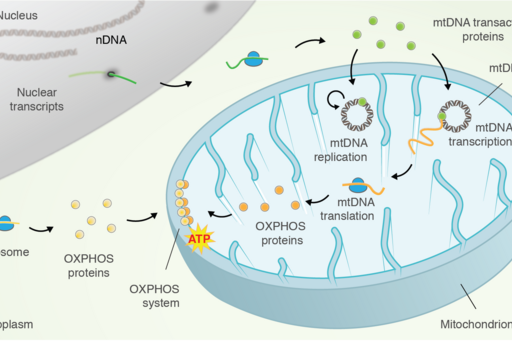
Molecular mechanisms of DNA replication in human mitochondria
Short description
Cells contain thousands of mitochondria that are required to convert food into usable energy forms via the respiratory chain. Mitochondria have their own genomes (mtDNA) that in mammals encode 13 of the 90 respiratory chain proteins. All other mitochondrial proteins, including those necessary for mtDNA replication, are encoded in the nucleus. Mutations in the nuclear-encoded mtDNA maintenance proteins can cause neurodegeneration and muscle diseases. Mitochondrial dysfunction is also associated with common age-associated diseases (e.g. diabetes and Parkinson's). Maria Falkenberg's lab investigates basic mechanisms of human mtDNA replication in health and disease. Much of the work involves in vitro biochemistry and reconstituted systems for mammalian mtDNA replication, using different types of artificial templates and recombinant proteins.

Mitochondria are required to convert food into usable energy forms and every cell contains thousands of them. Unlike most other cellular compartments, mitochondria have their own genomes (mtDNA) that in mammals encode 13 of the about 90 proteins present in the respiratory chain. The existence of a separate mtDNA genome is explained by the widely accepted endosymbiotic theory, according to which the mitochondrion developed from an α-proteobacterium. During the course of time, ancestral bacterial genes have been transferred from the mitochondrial to the nuclear genome, which explains why all proteins necessary for mtDNA replication, as well as transcription and translation of mtDNA genes, are encoded in the nucleus. Mutations in nuclear-encoded proteins required for mtDNA maintenance are an important cause of neurodegeneration and muscle diseases. Mitochondrial dysfunction is also associated with common age-associated diseases (e.g. diabetes mellitus type II and Parkinson disease).
In the laboratory we are investigating the basic mechanisms of human mtDNA replication and how this process is regulated. In addition, we address the functional consequences of disease-causing mutations in genes required for mtDNA maintenance. Much of the work is performed using in vitro biochemistry and reconstituted systems for mammalian mtDNA replication, using different types of artificial templates and recombinant proteins.
Maria Falkenberg
Principal Investigator
Affiliation:
Department of Medical Biochemistry and Cell Biology,
Institute of Biomedicine

Group members
Ulrika Alexandersson
Alena Aliashkevich
Direnis Erdinc
Emily Hoberg
Katarina Johansson
Seoeun Lee
Bertil Macao
Örjan Persson
Urška Rovšnik
Madalina Sãcultanu
Sirelin Sillamaa
Sebastian Valenzuela
Xiaolu Zhang